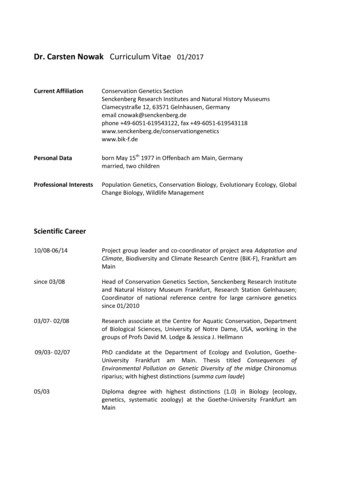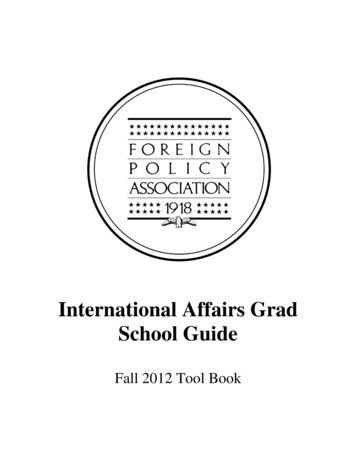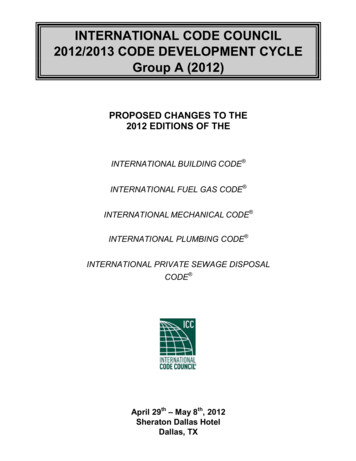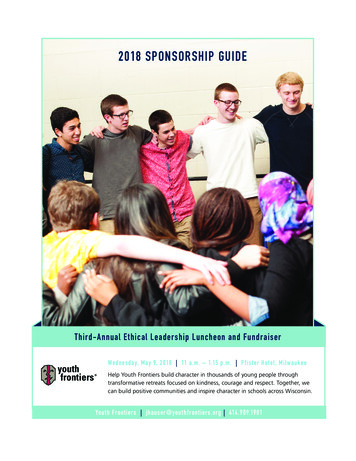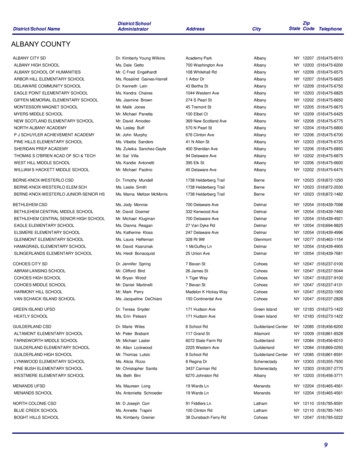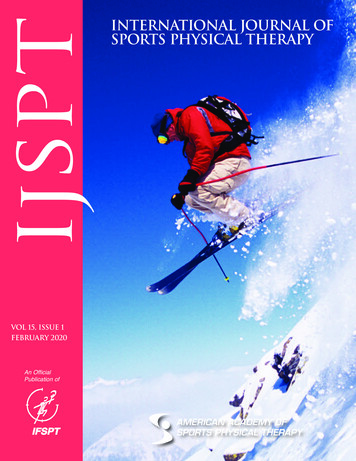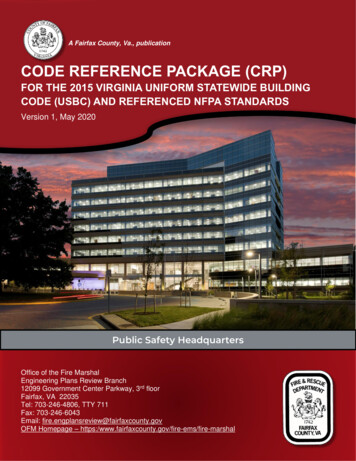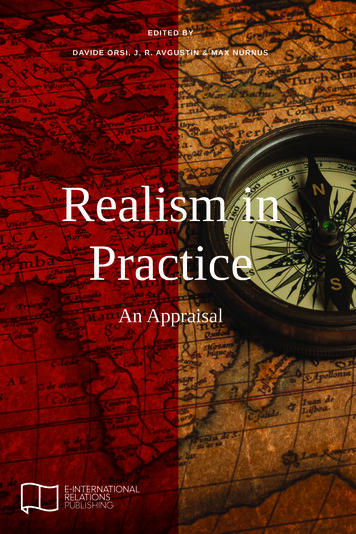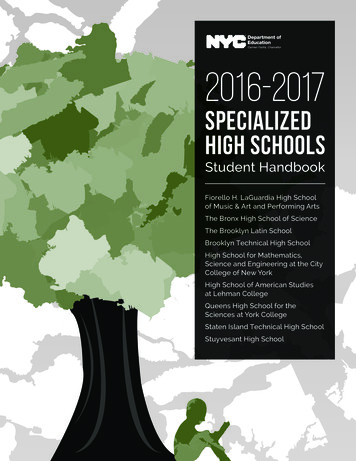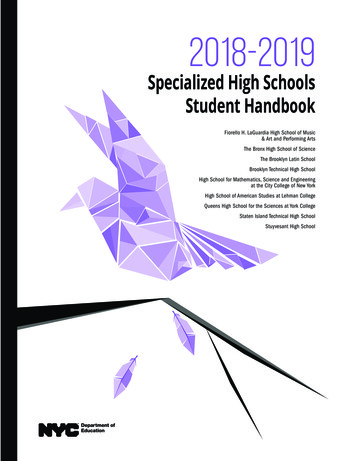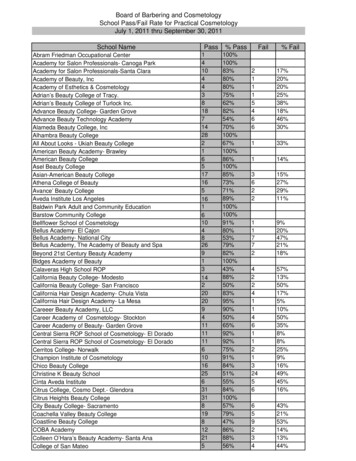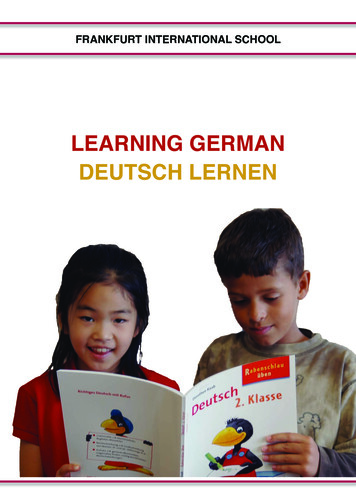
Transcription
FRANKFURT INTERNATIONAL SCHOOL
FRANKFURT INTERNATIONAL SCHOOLFrankfurt International SchoolOur mission is to be the leading, culturally diverse and family-oriented international school withEnglish as the principal language of instruction.We inspire individuals to develop their intellect, creativity and character to become independent,adaptable, socially responsible and internationally minded citizens, by ensuring a dynamic, inquirydriven education of the highest standard.International School Wiesbaden
INDEXIntroduction . . . . . . . . . . . . . . . . . . . . . . . . . . . . . . . . . . . . . . . . . . . . . . . . . . . . . . . 3Facts & Figures About Language Learning at FIS . . . . . . . . . . . . . . . . . . . . . . . . . . . 4Bilingual Education at FIS . . . . . . . . . . . . . . . . . . . . . . . . . . . . . . . . . . . . . . . . . . . . 5Language Proficiency Teaching and Assessment. . . . . . . . . . . . . . . . . . . . . . . . . . . . . 6PS/ES German Course Sequences & Explanations . . . . . . . . . . . . . . . . . . . . . . . 6 - 7Elementary School Objectives . . . . . . . . . . . . . . . . . . . . . . . . . . . . . . . . . . . . . . 8 - 17Sample Continuums in the Primary and Elementary School . . . . . . . . . . . . . . 18 - 22Upper School Course Sequences . . . . . . . . . . . . . . . . . . . . . . . . . . . . . . . . . . . . . . . 23Upper School Objectives . . . . . . . . . . . . . . . . . . . . . . . . . . . . . . . . . . . . . . . . . 24 - 35Why Learn German? . . . . . . . . . . . . . . . . . . . . . . . . . . . . . . . . . . . . . . . . . . . . 36 - 381
2
INTRODUCTIONFIS is driven by its mission statement and beliefs. These have produced a strategic plan which guides the school’sfuture expansion and provides direction for its academic courses. Language learning is an integral part of thestrategic plan.From the FIS Strategic Plan 2005-2010Action Plan #4: We will ensure that students develop and increase proficiency in English and additionallanguages, taking into account demographic changes.Specific Result 4.5: Students will have a clearly articulated, cohesive German learning program which reflectsbest practices for each developmental level.The school’s policy manual contains four statements which deal directly with the importance of learningGerman at all levels.Extract from Policy 7.5043.As host country language, German is offered at all levels throughout the school at a sufficient number ofproficiency levels to meet the educational needs of all students.3.1In general, all students are expected to be enrolled in German language classes unless they have special educationalneeds, identified by qualified faculty, which specifically preclude such study.3.2Students who are German citizens and/or permanent legal residents of Germany are generally required to attendGerman classes throughout the period of their enrollment at FIS. Such classes may be offered within the regularGerman program or by means of dual language, immersion or bilingual classes.3.3Other students in grades 9-12 may choose an alternative language course once they have met what the schooldetermines to be the minimum proficiency requirements in German by means of an appropriate test. In somecases, permission may be granted to a student who enters grades 9-12 who does not met minimum proficiencyrequirements in German to choose an alternative language course in order to fulfill the requirements of theInternational Baccalaureate program for the entry requirements of a particular institution of higher or furthereducation.3
FACTS AND FIGURES ABOUT LANGUAGE LEARNINGThe school focuses on results. It is committed to the expansion of its language programsand it is proud of the achievement of its students. As of the 2009/2010 school year, there are 12 languages being studied at FIS: English,German, French, Spanish, Japanese, Korean, Swedish, Dutch, Chinese, Norwegian,Farsi and Slovene. 70% of our students are non-native English speakers. The vast majority are able toattend mainstream English classes after just two years of ESL instruction. All students learn in an English immersion environment. All take English languagearts courses and 99% are enrolled in German language arts. 75% of elementary school students who began learning German in grade 2 or earlierare able to attend German classes at (near) native level by grade 8. 40% of all FIS students speak three or more languages. 70% of FIS students graduate with the International Baccalaureate Bilingual Diploma. 95% of all students applying with the IB Bilingual Diploma to the Kultusministeriumfor Abitur equivalence were awarded a grade of 2 or higher. Over the past years, our students have a 100% pass rate in IB mother tongueexaminations. FIS also offers adult education classes in ESL, German and Italian as a foreign languageand German, Spanish and French as part of the REAL (after-school) program.4
BILINGUAL EDUCATION AT FISThe benefits of a bilingual education have been known for many years. Students perform just as well and oftenbetter than monolinguals on standardized tests; they are able to communicate with more people in more places;bilinguals exhibit greater nonverbal problem-solving abilities and more flexible thinking; the bilingual learner’sbrain is exercised more- both hemispheres are active when using more than one language; there are fewermemory lapses with older people and the risk of Alzheimer’s disease is lowered.At our Wiesbaden Campus, an integrated German program is part of the curriculum in grades one to three.Teachers present aspects of the Units of Inquiry of the PYP program in German and differentiate their instructionaccording to the proficiency level of the student in mixed German language ability homeroom classes. In gradesfour and five, all children receive German language arts instruction three times a week and content-basedinstruction twice a week in leveled groups.In the primary school at FIS, there is an integrated program in which art is taught in German and English tochildren in primary through grade 1. Beginning in the 2009/2010 school year in the elementary school, thecurrent “immersion” program will be phased out over a three-year period. It will be replaced by daily contentbased German language arts classes in leveled groups and by an optional “integrated German” program ingrade three followed by an optional two-year English/German bilingual program in grades 4 and 5 where halfthe curriculum is presented in each language. Admission to the integrated and bilingual programs depends onthe proficiency level of the student’s English and German. In grades 6, 7 and 8, there is an optional integratedGerman program for suitable applicants where one complete academic course is taught in German. To date, thishas been either humanities or science.At the end of grade 12, if a student has passed the IB diploma with German and English as Language A1 andA2 (as well as either a science or mathematics at higher level), s/he is awarded a bilingual diploma which isrecognized by the German Kultusministerium as the equivalent of the Abitur.5
LANGUAGE PROFICIENCY TEACHING AND ASSESSMENTProficiency means what one can do with a language in the areas of speaking, listening, reading and writing.Students are regularly tested in these areas by means of standardized tests which indicate what their proficiencylevels are according to grids developed by the American Council on the Teaching of Foreign Languages (ACTFL)and by the Center for Applied Linguistics (CAL). Furthermore, students are also placed on a continuum forGerman, established by the teachers at FIS, which was modeled on the language learning continuums by thewell-known researcher Bonnie Campbell Hill. A continuum indicates to teachers and parents the steps a learnerhas taken in improving his/her language learning and the steps still to be taken.What follows are the sequences and the desired proficiency objectives of German courses at FIS.PS/ES GERMAN COURSE SEQUENCESfrom entry point in each gradePrimary SchoolHeritage LearnerForeign LearnerBilingual LearnerForeign rade ateElementary SchoolHeritage LearnerForeign LearnerBilingual LearnerForeign LearnerForeign LearnerForeign LearnerForeign LearnerForeign Learner6Grade 2FluentIntermediate 1Intermediate 1/2Intermediate 1BeginnerGrade 3FluentIntermediate 2Intermediate 2/3Intermediate 2Intermediate 1BeginnerGrade 4FluentIntermediate 3Intermediate 3/Adv.Intermediate 2Intermediate 2Intermediate 1BeginnerGrade 5FluentAdvanced/FluentAdvanced/FluentIntermediate 3Intermediate 2/3Intermediate 2Intermediate 1Beginner
PRE-PRIMARY, PRIMARY, GRADE 1 - BEGINNERSBy the end of this course, the beginning learner will be able to: Listening:ofollow two-step directions and respond to familiar questions Speaking:orespond to questions using German phrases; communicate with simple language patterns.PRE-PRIMARY, PRIMARY - ADVANCED/FLUENTBy the end of this course, the advanced learner will be able to: Listening:ounderstand detailed questions and follow multi-step directions Speaking:ospeak confidently and use vocabulary flexibly; name with complex phrases (everyday language)GRADE 1 - ADVANCED/FLUENTBy the end of this course, the learner will be able to: Reading:oread topic related words with guidance; describe story line and make predictions Writing:owrite 1-2 sentences about a familiar topic using key vocabulary, familiar words and resourcesprovided7
GRADE 2 GERMAN – BEGINNERSThe learner will: Oral communication:ounderstand simple questions and commands about familiar topicsoshow comprehension when read or spoken toofollow directions with familiar instructionsouse a limited number of isolated words, simple phrases or memorized expressionsoask and answer simple questions Reading:oread simple words with correct pronunciationocomprehend the meaning of simple written materialofollow simple written instructions Writing:ocopy words and phrases with accuracyobegin to spell basic words correctlyowrite simple words and familiar phrasesGRADE 2 GERMAN – INTERMEDIATE 1The learner will: Oral communication:ounderstand familiar and some new sentence-level language with contextual supportouse basic language in a limited number of everyday social and academic situationsobegin to conjugate present tense of regular verbs Reading:oread with correct pronunciationodemonstrate comprehension of written material Writing:owrite short, simple sentences about prepared topicsouse present tense of regular verbsospell basic vocabulary accurately8
GRADE 2 GERMAN – INTERMEDIATE 2The learner will: Oral communication:ounderstand and respond to speech in familiar and new contexts, with some contextualsupportouse basic vocabulary to discuss personal and prepared academic topicsouse sentence level speechoconjugate regular verbs in present tense Reading:oread with correct pronunciationodemonstrate comprehension of written material Writing:owrite sentences about personal and prepared academic topicsouse present tense forms of regular and irregular verbsospell basic vocabulary accuratelyGRADE 2 GERMAN – INTERMEDIATE 3The learner will: Oral communication:ounderstand and respond to connected speech about familiar and unfamiliar topicsouse varied vocabulary to describe personal and academic topicsobegin to use connected speech in everyday social and academic situationsoconjugate regular verbs in present tense and attempt past tense Reading:oread with correct pronunciationodemonstrate comprehension of easy readers with guidance Writing:owrite sentences about personal and prepared academic topicsoconjugate regular and irregular verbs in present tense and attempt past tenseospell basic vocabulary accurately9
GRADE 2 GERMAN – ADVANCED/FLUENTThe learner will: Oral communication:ocomprehend main ideas and most details in connected speech on a variety of topicsocommunicate ideas and thoughts clearly and confidentlyouse age appropriate vocabulary when talking about general and academic topicsoshow good control of present and past tenses Reading:odecode written material successfully using context, grammar and phonic cuesoread early reader books with fluencyolearn and share information from readingobegin to interpret meaning with guidance Writing:owrite several sentences on a topicouse present and past tense correctlyobegin to apply punctuation and capitalization rulesospell basic words correctlyGRADE 3 GERMAN – BEGINNERSThe learner will: Oral communication:ounderstand simple questions and commands about familiar topicsoshow comprehension when read or spoken toofollow directions with familiar instructionsouse a limited number of isolated words, simple phrases or memorized expressions Reading:oread simple words with correct pronunciationocomprehend the meaning of simple written materialsofollow written instructions Writing:ocopy words and phrases with accuracyowrite simple words and familiar phrasesospell basic words correctlyobegin to capitalize nouns10
GRADE 3 GERMAN – INTERMEDIATE 1The learner will: Oral communication:ounderstand familiar and some new sentence-level language with contextual supportouse basic language in a limited number of everyday social and academic situationsobegin to conjugate present tense of regular verbs Reading:owrite short simple sentence about prepared topicsodemonstrate comprehension of written materialouse reference materials Writing:owrite short simple sentences about prepared topicsouse present tense of regular verbsospell basic vocabulary accuratelyGRADE 3 GERMAN – INTERMEDIATE 2The learner will: Oral communication:ounderstand and respond to speech in familiar and new contexts, with some contextual supportouse basic vocabulary to discuss personal and prepared academic topicsouse sentence level speechoconjugate regular verbs in present tense Reading:oread with correct pronunciationodemonstrate comprehension of written materialouse reference materials Writing:owrite sentences about personal and academic topicsouse present tense of regular and some irregular verbsospell basic vocabulary accurately11
GRADE 3 GERMAN – INTERMEDIATE 3The learner will: Oral communication:ounderstand and respond to connected speech about familiar and unfamiliar topicsouse varied vocabulary to describe personal and academic topicsobegin to use connected speech in everyday social and academic situationsoconjugate regular verbs in present tense and attempt past tense Reading:oread with correct pronunciationodemonstrate comprehension of easy readersouse reference materials Writing:owrite connected sentences about personal and academic topicsoconjugate regular and some irregular verbs in present tense and attempt past tenseobegin to apply basic spelling rulesGRADE 3 GERMAN – ADVANCED/FLUENTThe learner will: Oral communication:ocomprehend main ideas and most details in connected speech on a variety of topicsocommunicate ideas and thoughts clearly and confidentlyouse age appropriate vocabulary when talking about general and academic topicsoshow good control of present and past tenses Reading:odecode written material successfully using context, grammar and phonic cuesoread easy chapter books with fluencyolearn and share information from readingointerpret meaning (sequence, characters) with guidance Writing:owrite short fiction, descriptions and poetry with guidanceouse present and past tense correctlyoedit for capitalization and punctuationoapply basic spelling rules12
GRADE 4 GERMAN – BEGINNERSThe learner will: Oral communication:ounderstand simple questions and commands about familiar topicsoshow comprehension when read or spoken toofollow directions with familiar instructionsouse a limited number of isolated words, simple phrases or memorized expressionsoask and answer simple questions Reading:oread simple words with correct pronunciationocomprehend the meaning of simple written materialsofollow written instructions Writing:ocopy words and phrases with accuracyowrite simple words and familiar phrasesospell basic words correctlyocapitalize nouns with guidanceobegin to apply grammatical rulesGRADE 4 GERMAN – INTERMEDIATE 1The learner will: Oral communication:ounderstand familiar and some new sentence-level language with contextual supportouse basic language in a limited number of everyday social and academic situationsobegin to conjugate present tense of regular verbs Reading:oread with correct pronunciationodemonstrate comprehension of written materialouse reference materials Writing:owrite short simple sentences about prepared topicsouse present tense of regular verbsobegin to use correct word orderospell basic vocabulary accurately13
GRADE 4 GERMAN – INTERMEDIATE 2The learner will: Oral communication:ounderstand and respond to speech in familiar and new contexts, with some contextual supportouse basic vocabulary to discuss personal and prepared academic topicsouse sentence level speechoconjugate regular verbs in present tense Reading:oread with correct pronunciationodemonstrate comprehension of written materialsouse reference materials Writing:oWrite sentences about topics of personal interest and prepared academic topicsoUse present tense of regular verbs and some irregular verbsoUse correct word orderoApply connectorsGRADE 4 GERMAN – INTERMEDIATE 3The learner will: Oral communication:ounderstand and respond to speech about familiar and unfamiliar topicsouse varied vocabulary to describe personal and academic topicsobegin to use connected speech in everyday social and academic situationsoconjugate regular verbs in present tense and attempt past tense Reading:oread with correct pronunciationodemonstrate comprehension of written materialsouse reference materials Writing:owrite sentences about personal topics and academic topicsoconjugate verbs in present tense and begin to use past tenseouse correct word order and apply connectorsobegin to apply spelling rules14
GRADE 4 GERMAN – ADVANCED/FLUENTThe learner will: Oral communication:ocomprehend main ideas and most details in connected speech on a variety of topicsocommunicate ideas and thoughts clearly and confidentlyouse age appropriate vocabulary when talking about general and academic topicsoshow good control of present and past tenses Reading:oread medium level chapter books with fluencyobegin to expand knowledge of different genresogather information from texts with guidanceodiscuss setting, plot, characters, and point of view with guidance Writing:owrite organized fiction and non fiction pieces with guidanceouse present and past tenses correctlyorevise for clarity and details with guidanceoapply spelling rulesGRADE 5 GERMAN – BEGINNERSThe learner will: Oral communication:ounderstand simple questions and commands about familiar topicsoshow comprehension when read or spoken toofollow directions with familiar instructionsouse a limited number of isolated words, simple phrases or memorized expressionsoask and answers simple questions Reading:oread simple words with correct pronunciationocomprehend the meaning of simple written materialsofollow written instructions Writing:ocopy words and phrases with accuracyowrite simple words and familiar phrasesospell basic words correctlyocapitalize nouns with guidanceobegin to apply grammatical rules15
GRADE 5 GERMAN – INTERMEDIATE 1The learner will: Oral communication:ounderstand familiar and some new sentence-level language with contextual supportouse basic language in a limited number of everyday social and academic situationsobegin to conjugate present tense of regular verbs Reading:oread simple words with correct pronunciationodemonstrate comprehension of written materialouse reference materials Writing:owrite short simple sentences on prepared topicsouse present tense of regular verbsobegin to use correct word orderospell basic vocabulary accuratelyGRADE 5 GERMAN – INTERMEDIATE 2The learner will: Oral communication:ounderstand and respond to speech in familiar and new contexts, with some contextual supportouse basic vocabulary to discuss personal and prepared academic topicsouse sentence level speechoconjugate regular verbs in present tense Reading:oread with correct pronunciationodemonstrate comprehension of written materialouse reference materials Writing:owrite sentences about personal and academic topicsouse present tense of regular and some irregular verbsouse correct word orderoapply connectorsobegin to apply spelling rules16
GRADE 5 GERMAN – INTERMEDIATE 3The learner will: Oral communication:ounderstand and respond to connected speech about familiar and unfamiliar topicsouse varied vocabulary to discuss describe personal and academic topicsobegin to use connected speech in everyday social and academic situationsoconjugate regular verbs in present tense and attempt past tense Reading:oread with correct pronunciationodemonstrate comprehension of easy readersouse reference materials Writing:owrite sentences about personal and academic topics independentlyoconjugate verbs in present tense and begin to use past tenseouse correct word order and apply connectorsoapply spelling rulesGRADE 5 GERMAN – ADVANCED/FLUENTThe learner will: Oral communication:oComprehend main ideas and most details in connected speech on a variety of topicsoCommunicate ideas and thoughts clearly and confidentlyoUse age appropriate vocabulary when talking about general and academic topicsoShow good control of present and past tenses Reading:oread challenging children’s literature with fluencyoexpand knowledge of different genresogather information from texts independentlyobegin to gain deeper meaning through interpretation with guidance Writing:obegin to write organized fiction and non fiction pieces independentlyouse present and past tenses correctlyorevise for clarity, details and word choiceoapply correct spelling17
18 Begins to choose reading materials(e.g., books, magazines, and charts)and has favorites.Shows interest in reading signs,labels, and logos (environmentalprint).Recognizes own name in print.Holds book and turns pagescorrectly.Shows beginning/end of book orstory.Knows some letter names.Listens and responds to literatureComments on illustrations inbooks.Participates in group reading(books, rhymes, poems, and songs).Preconventional(Novice) Memorizes pattern books, poems,and familiar books.Begins to read signs, labels, andlogos (environmental print).Demonstrates eagerness to read.Pretends to read.Uses illustrations to tell stories.Reads top to bottom, left to right,and front to back with guidance.Knows most letter names and someletter sounds.Recognizes some names and wordsin context.Makes meaningful predictions withguidance.Rhymes and plays with words.Participates in reading of familiarbooks and poems.Connects books read aloud to ownexperiences with guidance.Emerging(Novice) Reads books with simple patterns.Begins to read own writing.Begins to read independently forshort periods (5-10 minutes).Relies on illustrations and print.Uses finger-print-voice matching.Knows most letter sounds and letterclusters.Recognizes simple words.Uses growing awareness of soundsegments (e.g., phonemes, syllables,rhymes) to read words.Begins to make meaningfulpredictions.Identifies titles and authors inliterature (text features).Retells main event or idea inliterature.Sees self as reader.Explains why literature is liked/disliked during class discussionswith guidance.Developing(Int. Low) Reads early reader books.Reads and follows simple writtendirections with guidance.Identifies basic genres (e.g., fiction,nonfiction, and poetry).Uses basic punctuation whenreading orally.Reads independently (10-15minutes).Chooses reading materialsindependently.Learns and shares information fromreading.Uses meaning cues (context).Uses sentence cues (grammar).Uses letter/sound cues and patterns(phonics).Recognizes word endings, commoncontractions, and many highfrequency words.Begins to self-correct.Retells beginning, middle, and endwith guidance.Discusses characters and storyevents with guidance.Identifies own reading behaviorswith guidance.Beginning(Int. Mid)ps/es deutsch reading continuum Reads easy chapter books.Chooses, reads, and finishes avariety of materials at appropriatelevel with guidance.Begins to read aloud with fluency.Reads silently for increasinglylonger periods (15-30 minutes)Discusses favorite reading materialwith others.Uses reading strategiesappropriately, depending on thetext and purpose.Uses word structure cues (e.g.,root words, prefixes, suffixes,word chunks) when encounteringunknown words.Increases vocabulary by usingmeaning cues (context).Self-corrects for meaning.Follows written directions.Identifies chapter titles and table ofcontents (text organizers).Summarizes and retells story eventsin sequential order.Responds to and makes personalconnections with facts, characters,and situations in literature.Compares and contrasts charactersand story events.Begins to interpret meaning withguidance.Participates in guided literaturediscussions.Identifies own reading strategiesand sets goals with guidance.Expanding(Int. High)
19 Reads medium level chapter books.Chooses reading materials atappropriate level.Expands knowledge of differentgenres (e.g., realistic fiction,historical fiction, and fantasy).Reads aloud with expression.Uses resources (e.g., encyclopedias,CD-ROMs, and nonfiction texts)to locate and sort information withguidance.Gathers information by using thetable of contents, captions, glossary,and index (text organizers) withguidance.Gathers and uses information fromgraphs, charts, tables, and mapswith guidance.Increases vocabulary by using contextcues, other reading strategies, andresources (e.g., dictionary andthesaurus) with guidance.Demonstrates understanding of thedifference between fact and opinionwith guidance.Follows multi-step writtendirections independently.Discusses setting, plot, characters,and point of view (literaryelements) with guidance.Responds to issues and ideas inliterature as well as facts or storyevents.Makes connections to other authors,books, and perspectives.Participates in small groupliterature discussions with guidance.Uses reasons and examples to supportideas and opinions with guidance.Bridging(Advanced) Reads challenging children’sliterature.Selects, reads, and finishes a widevariety of genres with guidance.Begins to develop strategies andcriteria for selecting readingmaterials.Reads aloud with fluency,expression, and confidence.Reads silently for extended periods(30-40 min.).Begins to use resources (e.g.,encyclopedias, articles, Internet,and nonfiction texts) to locateinformation.Gathers information using thetable of contents, captions,glossary, and index (text organizers)independently.Begins to use resources (e.g.,dictionary and thesaurus) toincrease vocabulary in differentsubject areas.Begins to discuss literature withreference to setting, plot, characters,and theme (literary elements), andauthor’s craft.Generates thoughtful oral andwritten responses in small groupliterature discussions with guidance.Begins to use new vocabulary indifferent subjects and in oral andwritten response to literature.Begins to gain deeper meaningthrough interpretation.Begins t o set g oals a nd i dentifiesstrategies to improve reading.Fluent(Deutsch) Reads complex children’s literature.Reads and understands informationaltexts (e.g., want ads, brochures,schedules, catalogs, manuals) withguidance.Develops strategies and criteriafor selecting reading materialsindependently.Uses resources (e.g., encyclopedias,articles, Internet, and nonfiction texts)to locate information independently.Gathers and analyzes informationfrom graphs, charts, tables, and mapswith guidance.Integrates information from multiplenonfiction sources to deepenunderstanding of a topic withguidance.Uses resources (e.g., dictionary andthesaurus) to increase vocabularyindependently.Identifies literary devices (e.g.,similes, metaphors, personification,and foreshadowing) with guidance.Discusses literature with reference totheme, author’s purpose, and style(literary elements), and author’s craft.Begins to generate in-depth responsesin small group literature discussions.Begins to generate in-depth writtenresponses to literature.Uses increasingly complex vocabularyin different subjects and in oral andwritten response to literature.Uses reasons and examples to supportideas and conclusionsProbes for deeper meaning byreading between the lines” /throughinterpretation in response to literature.Proficient (Norm)(Deutsch)ps/es deutsch reading continuum (continued)
20 Relies primarily on pictures toconvey meaning.Begins to label and add “words” topictures.Writes first name.Demonstrates awareness that printconveys meaning.Makes marks other than drawingon paper (scribbles).Writes random recognizable lettersto represent words.Tells about own pictures andwriting.Preconventional(Novice) Uses pictures and print to conveymeaning.Writes words to describe or supportpictures.Copies signs, labels, names, andwords (environmental print).Demonstrates understanding ofletter/sound relationship.Prints with upper case letters.Matches letters to sounds.Uses beginning consonants to makewords.Uses beginning and endingconsonants to make words.Pretends to read own writing.Sees self as writer.Takes risks with writing.Emerging(Novice) Writes 1-2 sentences about a topic.Writes names and familiar words.Generates own ideas for writing.Writes from top to bottom, left toright, and front to back.Intermixes upper and lower caseletters.Experiments with capitals.Experiments with punctuation.Begins to use spacing betweenwords.Uses growing awareness of soundsegments (e.g., phonemes, syllables,rhymes) t
Foreign Learner German German Beginner/Intermediate Bilingual Learner German German Beginner/Intermediate Foreign Learner German German Beginner/Intermediate PS/ES GERMAN COURSE SEQUENCES from entry point in each grade . Reading: o read topic related word
